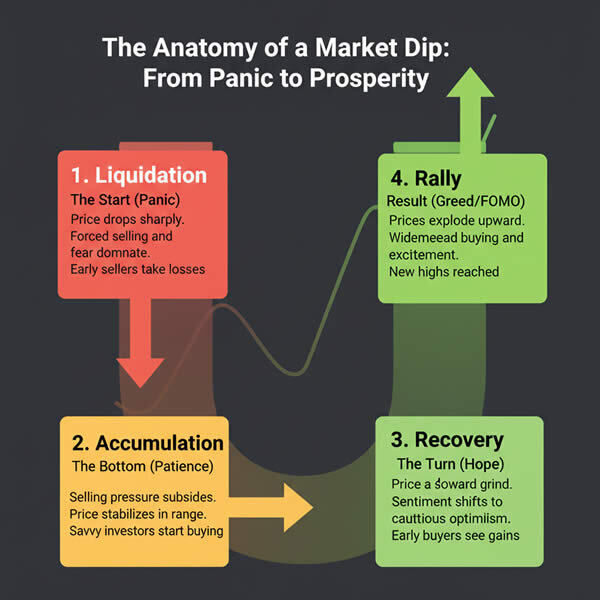Why This Bitcoin Dip Could Signal Crypto’s Strongest Bull Run Yet
In the ever-shifting sands of cryptocurrency, a Bitcoin dip can feel like a desert storm—blinding, disorienting, and seemingly endless. Retail investors scroll through X feeds filled with doomsday memes, while headlines warn of another crypto winter. Yet, some analysts think this isn’t chaos; it’s calibration. These large holders aren’t fleeing—they’re strategically redistributing, purging overleveraged froth to make way for sustainable growth.
Bitcoin, often dubbed digital gold, anchors the crypto ecosystem. Its price swings don’t just affect holders; they ripple through altcoins, DeFi protocols, and even traditional finance via ETFs. But history whispers a contrarian truth: dips like this have repeatedly preceded the market’s most explosive rallies. By shaking out weak hands, they foster innovation, attract institutional capital, and reinforce Bitcoin’s role as a hedge against fiat instability—especially in inflation-plagued economies (like Argentina, where the peso’s 200% annual devaluation makes crypto a lifeline).
For beginners eyeing their first sats or intermediates optimizing portfolios, understanding these dynamics transforms fear into opportunity. Let’s unpack why this dip might not be a pitfall, but a launchpad.
What Whale Sell-Offs Really Mean
At the heart of Bitcoin’s volatility lies a delicate balance of supply, demand, and psychology. Cowen’s analysis spotlights whales—institutional investors and early adopters holding vast BTC reserves—who are accelerating sales. This isn’t blind panic; it’s calculated. On-chain data reveals 50,000 BTC flowing to exchanges last month, a 30% spike, as whales lock in profits from the post-2024 halving surge that pushed BTC to $95,000 highs.
To demystify, consider the step-by-step mechanics, akin to a financial ecosystem reset:
- Post-Halving Accumulation: The April 2024 halving slashed miner rewards, tightening supply. Institutions via ETFs (e.g., BlackRock’s IBIT) and miners hoarded, driving a 120% rally.
- Euphoria Builds Leverage: Retail enters with FOMO. Futures open interest balloons to $40 billion, per Coinglass, as traders leverage up—borrowing to bet big.
- Whale Initiation: RSI hits overbought (70+). Whales distribute, selling into strength to rebalance portfolios, perhaps rotating to undervalued alts or fiat for macro hedges.
- Liquidation Cascade: A minor drop triggers margin calls. $2 billion in longs liquidate in a 5% slide, snowballing the dip.
- Capitulation and Rebound Setup: Fear & Greed Index plummets to 25. Weak positions exit, supply contracts, and smart money accumulates at discounts.
This process, some argue, is “market hygiene”—eliminating unsustainable leverage that could cause deeper crashes later. It’s like pruning a tree: short-term pain for long-term vigor.
Bitcoin’s Cyclical Patterns
Bitcoin’s price history, viewed logarithmically, reveals dips as mere blips in an upward arc.

As depicted, the 2018 85% crash gave way to 2021’s 300% surge. Today’s pullback echoes 2021’s mid-cycle correction, hinting at a potential 100%+ rebound.
Lessons from Crypto’s Volatile Past
Bitcoin’s origins in the 2008 financial crisis positioned it as an antidote to centralized failures. Yet, its own history is riddled with dips that tested this promise—each emerging stronger.
The 2018 bear, post-$20,000 peak, saw an 84% drop to $3,200. Retail capitulated, but long-term holders (per Glassnode) increased supply by 20%, stabilizing the network. This paved the 2020-2021 bull, amplified by DeFi and institutions.
2022’s woes—Terra-Luna collapse, FTX fallout—triggered a 75% drawdown. It exposed centralized risks, spurring self-custody (hardware wallets up 150%) and regulations like EU’s MiCA. ETF approvals followed, injecting $15 billion.
In Argentina, ranked 9th in global crypto adoption (Chainalysis), dips highlight utility: 2022’s crash boosted adoption 40% as citizens fled peso devaluation for stablecoins and BTC.
Cowen ties this to whale behavior, akin to 2017’s ICO unwind, which cleared hype for Ethereum’s rise.
Parallels from Traditional Markets: IPO Dips as Blueprints for Recovery
Crypto’s cycles aren’t isolated; they mirror traditional asset trajectories, particularly high-profile IPOs where initial hype yields to reality checks, then maturity. These stories—from Facebook’s lockup panic to Robinhood’s meme meltdown—illustrate how dips forge resilience, offering blueprints for Bitcoin’s path.
Facebook (Now Meta): Priced at $38 in 2012, FB soared then crashed 54% to $17.55 amid mobile ad doubts and lockup expirations. Recovery took 15 months, driven by user growth (900M to 1.2B) and mobile pivots. Today at $580+, it’s up 1,400%—a dip that pruned excess for empire-building.
Robinhood (HOOD): Debuting at $38 in 2021, it peaked at $85 before plunging 81% to $7.11 in 2022’s macro storm. Crypto relaunch and S&P inclusion fueled a 237% rise to $128 by 2025, maturing from meme broker to fintech staple.
Uber (UBER): At $45 in 2019, it dipped 47% to $24.08 on profitability woes. Diversification (Uber Eats) and cost cuts reclaimed highs; now at $82+, it’s globally entrenched.
Snowflake (SNOW): Opening at $245 in 2020, it fell 56% to $108.72. AI integrations spurred recovery to $135, emphasizing enterprise utility.
Airbnb (ABNB): Priced at $68 in 2020, it dipped 40% from highs amid COVID. Adaptations like virtual experiences lifted it to $145, turning crisis into profitability.
| IPO Case | Initial Price/Close | Post-IPO Low (% Drop) | Time to Recovery | Current Price (Nov 2025) | Key Catalyst |
|---|---|---|---|---|---|
| $38 | $17.55 (-54%) | 15 months | ~$580 | Mobile ads & user growth | |
| Robinhood | $38 | $7.11 (-81%) | 33 months | ~$128 | Crypto relaunch & S&P inclusion |
| Uber | $45 | $24.08 (-47%) | 17 months | ~$82 | Eats expansion & cost discipline |
| Snowflake | $245 (open) | $108.72 (-56%) | 28 months | ~$135 | AI integrations & enterprise wins |
| Airbnb | $68 | $81 (-40% from high) | 31 months | ~$145 | Experiences & profitability |
These arcs—40-80% dips, 2-3 year recoveries—parallel Bitcoin’s bears. They underscore execution over euphoria, a lesson for crypto: post-dip innovation (e.g., layer-2 scaling) drives highs.
Real-World Applications: How Dips Fuel Adoption and Innovation
Dips catalyze ecosystem evolution:
- Institutional Inflows: MicroStrategy added 10,000 BTC at $25,000 in 2022—now worth $750M. Fidelity’s 2025 entries echo this.
- Altcoin Shifts: BTC dips rotate capital; Solana’s TVL rose 25% to $8B recently.
- Emerging Market Refuge: In Argentina, a local X user noted: “Bought sats at ARS 50M/BTC in 2022—now my inflation shield.”

Challenges and Risks
Dips aren’t painless:
- Psychological Strain: 70% retail sells lows (Dalbar); in Argentina’s poverty (40% households), it’s amplified.
- Leverage Pitfalls: 60% 2025 liquidations were retail.
- External Pressures: Geopolitics prolong slumps.
Mitigate with DCA, diversification, and tools like Swan Bitcoin. Focus on fundamentals.
| Aspect | Pros of Dips | Cons of Dips | Mitigation Strategies |
|---|---|---|---|
| Market Health | Reduces leverage, stabilizes prices | Increases volatility short-term | Monitor on-chain metrics (e.g., MVRV Z-Score <1 signals buy) |
| Adoption | Attracts value hunters | Deters newcomers | Educational content on platforms like Cryptopress.site |
| Innovation | Funds R&D in alts | Starves weak projects | Focus on fundamentals (team, tech, tokenomics) |
| Economic Impact | Hedges inflation in EMs | Amplifies local currency woes | Pair with stablecoins like USDT |
Turn the Dip into Your Advantage
Bitcoin’s whale-driven dip is a purge, not a peril—echoing IPO recoveries that birthed titans. It clears the path for robust growth, rewarding the steadfast.
Beginners: Start with education. Intermediates: Accumulate strategically.
Sources:
Glassnode, Chainalysis, Bloomberg, CoinMetrics, Galaxy Digital, Yahoo Finance, CNBC, company 10-Ks.
© Cryptopress. For informational purposes only, not offered as advice of any kind.
Latest Content
- CryptoGames Redefines the Future of Crypto Gambling with Transparency, Innovation, and Unmatched Player Experience
- Introducing Filecoin Onchain Cloud: Verifiable, Developer-Owned Infrastructure
- El Salvador Acquires $100M in Bitcoin Amid Price Slump
- Bitcoin’s 14-Day RSI Signals Oversold Conditions
- Why This Bitcoin Dip Could Signal Crypto’s Strongest Bull Run Yet
Related
- Circle’s IPO Soars on Wall Street Historic Surge: The stock peaked at $123.51 on June 6, nearly quadrupling its IPO price, though trading was halted multiple times due to volatility....
- Grayscale Files for IPO to Merge Crypto with Traditional Finance by Late 2025 The move aligns with Bitcoin’s record highs above $120,000 and growing institutional interest in crypto....
- Circle’s Wall Street Debut: Is the USDC Issuer Overvalued After Explosive IPO? Circle's (CRCL) Financials and Future in the Trillion-Dollar Stablecoin Market....
- Bitcoin Treasury Trend Gains Momentum Over 135 public companies now hold Bitcoin (BTC) as a treasury reserve, led by Strategy’s aggressive acquisition strategy....





